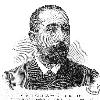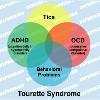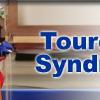

Portrait of Georges Gilles de la Tourette (1857–1904). Tags: Tourette Syndrome View |
Tags: Tourette Syndrome View |
Tags: Tourette Syndrome View |
|||||||||
Tourette syndrome (also called Tourettes syndrome, Tourettes disorder, Gilles de la Tourette syndrome, GTS or, more commonly, simply Tourettes or TS) is an inherited (heredity) neuropsychiatric (Neuropsychiatry) disorder with onset in childhood, characterized by the presence of multiple physical (motor) tics and at least one vocal (phonic) tic; these tics characteristically wax and wane. Tourettes is defined as part of a spectrum (spectrum disorder) of tic disorders, which includes transient and chronic tics.
Tourettes was once considered a rare and bizarre syndrome, most often associated with the exclamation of obscene words or socially inappropriate and derogatory remarks (coprolalia). This symptom is actually present in only a small minority of people with Tourettes, however. Tourettes is no longer considered a rare condition, but it may not always be correctly identified because most cases are classified as mild. Between 1 and 10 children per 1,000 have Tourettes; as many as 10 per 1,000 people may have tic disorders, with the more common tics of eye blinking, coughing, throat clearing, sniffing, and facial movements. People with Tourettes have normal life expectancy and intelligence. The severity of the tics decreases for most children as they pass through adolescence, and extreme Tourettes in adulthood is a rarity. Notable individuals with Tourettes (Sociological and cultural aspects of Tourette syndrome#Notable individuals) are found in all walks of life.
Genetic (Genetics) and environmental factors each play a role in the etiology of Tourettes, but the exact causes are unknown. In most cases, medication is unnecessary. There is no effective medication for every case of tics, but there are medications and therapies that can help when their use is warranted. Explanation and reassurance alone are often sufficient treatment; education is an important part of any treatment plan.
The eponym was bestowed by Jean-Martin Charcot (1825-93) on behalf of his resident, Georges Albert �douard Brutus Gilles de la Tourette (Georges Gilles de la Tourette) (1859-1904), a French physician and neurologist (neurology), who published an account of nine patients with Tourettes in 1885.
Icd10: F95.2
Icd9: 307.23
Medlineplus: 000733
Emedicinesubj: med
Emedicinetopic: 3107
Emedicine Mult: eMedicine2neuro664
Diseasesdb: 5220
Omim: 137580
Meshid: D005879



